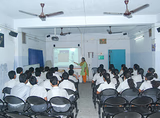
St. Jude'S High School, Madhyamgram, Kolkata
St. Jude'S High School, Madhyamgram, Kolkata Admission Enquiry
| Class | Session | Action |
|---|---|---|
Nursery | 2026-2027 | |
LKG | 2026-2027 | |
UKG | 2026-2027 | |
Class 1 | 2026-2027 | |
Class 2 | 2026-2027 | |
Class 3 | 2026-2027 | |
Class 4 | 2026-2027 | |
Class 5 | 2026-2027 | |
Class 6 | 2026-2027 | |
Class 7 | 2026-2027 | |
Class 8 | 2026-2027 | |
Class 9 | 2026-2027 | |
Class 10 | 2026-2027 | |
Class 11 | 2026-2027 | |
Class 12 | 2026-2027 |
St. Jude'S High School, Madhyamgram, Kolkata Quick Facts

Board
CISCE
Gender
Coed
Classes
Nursery - 12 Class
Academic Session
April to March
Medium
English
Student Teacher Ratio
6:1
Day/Boarding
Day School
Campus Size
9240 SQ MTR
St. Jude'S High School, Madhyamgram, Kolkata Fees Structure
St. Jude'S High School, Madhyamgram, Kolkata Documents Required
St. Jude'S High School, Madhyamgram, Kolkata Photos & Videos
St. Jude'S High School, Madhyamgram, Kolkata Languages Taught
St. Jude'S High School, Madhyamgram, Kolkata Facilities
Connect with Ezyschooling Counsellor
Aishwarya
+91-87xxxxxx64
English, Hindi
Fill in your details to view phone number
St. Jude'S High School
Parent & Student Reviews
Be the First to Review St. Jude'S High School
Your feedback matters! Help other parents make informed decisions by sharing your experience about St. Jude'S High School. Your honest review can guide families in choosing the right school.
St. Jude'S High School, Madhyamgram, Kolkata Enquire About Admissions
St. Jude'S High School, Madhyamgram, Kolkata Address And Contact
Plot No.160, Gate No. 1(2nd Right Lane from the Municipality),Basunagar
Plot No.160, Gate No. 1(2nd Right Lane from the Municipality),Basunagar, Madhyamgram, North 24 Parganas, Kolkata - 700129
St. Jude'S High School, Madhyamgram, Kolkata About Us
At St. Jude’s High School, teaching and learning happens in a happy and purposeful environment where each and every member of the school community is valued. We are privileged that our teachers and students represent many different cultures; this creates a richness and diversity within the school. Students experience a variety of teaching styles within which there may be formal teacher led lessons, group work, and investigation style and child-centred approaches. Information Technology is a central part in the learning process. St. Jude's High School Aims - To create a happy, caring and ordered environment in which pupils can feel secure and work to the best of their ability. - To provide opportunities for pupils to be involved in many independent and inter-dependent areas of learning and experience. - To help pupils develop lively, enquiring, imaginative and creative minds. - To help pupils develop communication skills. - To instil in pupils a sense of achievement. - To help pupils develop a reasoned set of attitudes, values and beliefs. - To encourage respect for others regardless of colour, creed, , personal or cultural background. - To help pupils understand and respect the society and world in which they live. The School's Mission Statement Knowledge, Character, Community The Mission Statement means Knowledge, Character, Community raised achievement of all students through: - Developing the full potential of each child - Maximising the opportunities for all to flourish - Pursuing Excellence - Valuing the individual - Working together - Preparing each child for a fulfilling role in a changing world. Statement of Curriculum Aim St. Jude's High School is striving to be a successful centre of excellence with care for the individual as its cornerstone. This care for the individual is expressed through high expectations, high standards of behaviour, and achievement. Most of all we want students to succeed to the best of their ability. We want students to have the confidence to uplift their ambitions for themselves. Focus on the individual: The Mission Statement means Knowledge, Character, Community raises achievement of all students through: - Developing the full potential of each child. - To consistently raise individual and whole-school levels of attainment. - To help students in the development of their own individuality and independence. - To help students acquire knowledge and skills relevant to adult life and employment in a rapidly changing world. - To provide quality education within a secure and stimulating environment, this ensures success and recognizes achievement. - To recognise the equality among all students. Continuity and Progression - To promote continuity in students' education by effective liaison with primary school, further education and employers. - To value and extend the skills, experiences and knowledge that students bring with them from primary schools and the outside world. - To help students develop interests and skills which will enable them to enjoy and make the best use of leisure time. - To help students develop the appreciation of education as a lifelong and enjoyable process. Environment of Learning - To provide a caring community where individuals are valued and where they are encouraged to develop their abilities to the full and to have a positive self image. - To help students to understand the multi cultural nature of society, to foster respect for those with different religions, beliefs and ways of life and to develop an attitude which is opposed to discrimination against a person or group. - To provide a well resourced and equipped school with excellent facilities for teaching and learning. - To extend students' experience of the outside world by offering varied opportunities such as excursions and work experience. Partners in Learning and Assessment - To promote active and responsible partnership with parents through effective communication and supportive involvement. - To develop positive partnerships with the wider local community through mutual cooperation and interaction. - To use assessment as a continuous process of recognizing achievement and development, both inside and outside school, so that it can be the basis of further progress. - These aims embrace all aspects of the learning process and should be achieved through a broad and balanced curriculum within the National Curriculum framework, yet relevant to the needs of each individual.
St. Jude'S High School, Madhyamgram, Kolkata Claim School

If you are an authorized person on this school behalf and want to start accepting applications/enquiries through ezyschooling platform for admissions, please claim this school.
Disclaimer
St. Jude'S High School, Madhyamgram, Kolkata FAQs
The average student-teacher ratio at St. Jude'S High School, Madhyamgram, Kolkata is 6:1.
The total cost of admission in St. Jude'S High School, Madhyamgram, Kolkata usually starts at Rs. Unknown and can go up to Rs. Unknown. This includes: NA .
- Debate
- Picnics and excursion
- Medical Room
- Music
- Drama
- Art and Craft
- Dance
Currently, we do not have any conclusive information on the scholarships available in St. Jude'S High School, Madhyamgram, Kolkata. Parents can direct contact the school for information on scholarships or fee reductions of any sort.
St. Jude'S High School, Madhyamgram, Kolkata is affiliated with CISCE board(s).
The academic session at St. Jude'S High School, Madhyamgram, Kolkata begins in April and continues through March of the following year.
St. Jude'S High School, Madhyamgram, Kolkata was established in the year 1995.
No, applications for St. Jude'S High School, Madhyamgram, Kolkata aren’t available on Ezyschooling. You can apply by visiting the school in person or using its official website. You can still use Ezyschooling to explore and compare schools that match your preferences. Alternatively, you can explore Ezyschooling to discover and compare schools that best match their preferences, even if applications for St. Jude'S High School, Madhyamgram, Kolkata are not directly available through the platform.




















